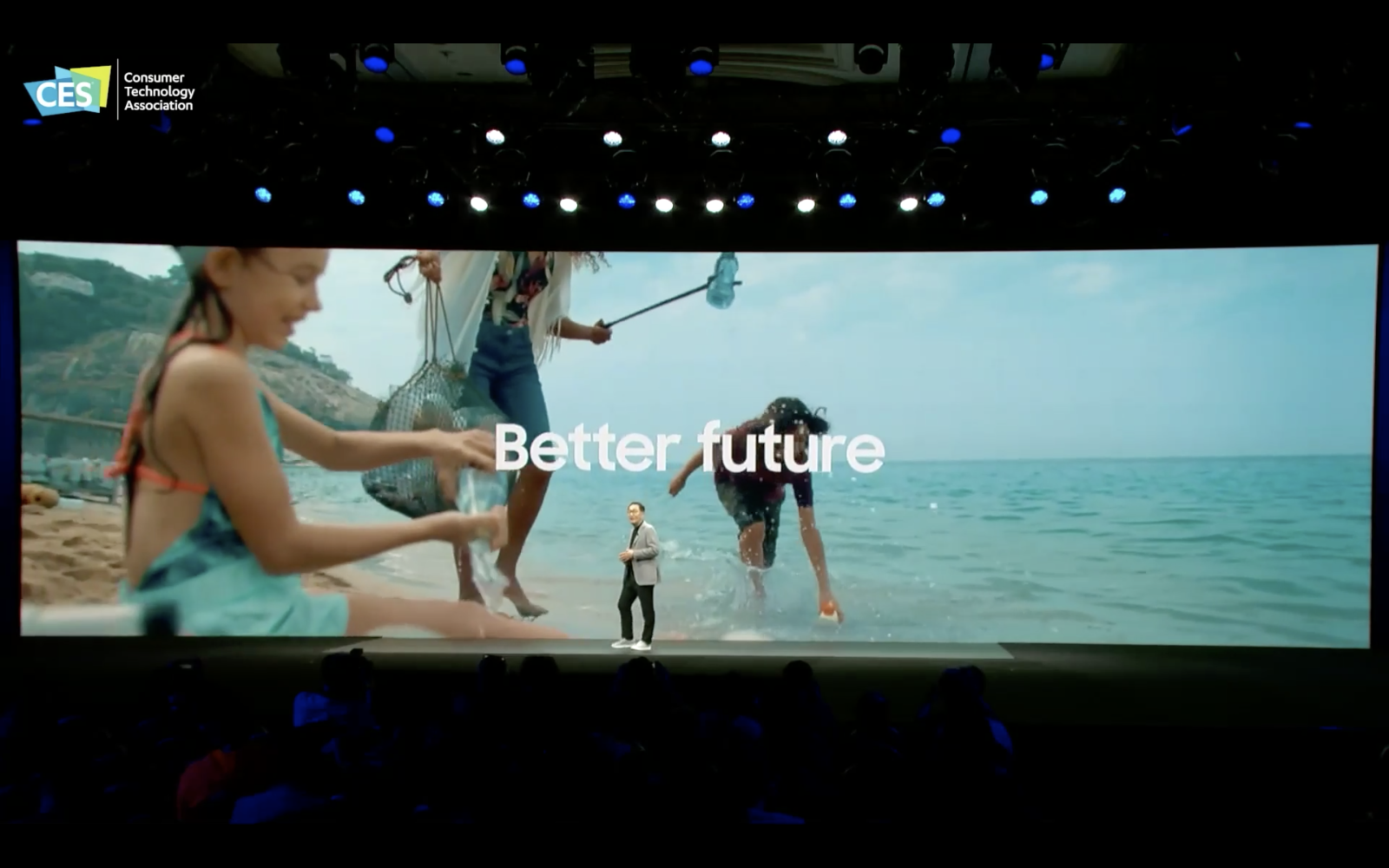Between presentations launching new PC processors and candy-colored refrigerators at last week’s CES, companies at the annual tech industry jamboree made a lot of big, flashy proclamations about climate change, some more serious than others, and most seeming to include at least one stock video clip of trees, solar panels and children frolicking in grassy meadows or on pristine beaches.
General Motors unveiled a new zero-emission pickup truck and dropped hints about new EV models to come, while Panasonic, which calculated that it released 110 million tons of CO2 per year and accounted for 1% of global electricity consumption, reiterated a pledge to decarbonize its operations by 2030 and promised to make its products more efficient. LG—which has pledged carbon neutrality by 2030, and to use fully renewable power by 2050—rolled out glass-fronted refrigerators (to avoid wasting energy while you look inside) and washing machines that use AI to shorten wash cycles. Samsung, whose CO2 emissions actually rose in 2020, and which has faced controversy over its reliance on coal energy, offered promises like devices that would use less standby power, which some environmentalists criticized as greenwashing.
A version of this story first appeared in the Climate is Everything newsletter. To sign up, click here.
Two years ago, before globally reported climate disasters reached their current alarming level of constancy, it might have been possible for events like CES to barely mention climate change, or to give sustainability only the barest lip service. But in this year’s celebration of a sector responsible for up to 3% of all global emissions, many tech companies found that ignoring the world’s rising temperatures wasn’t a palatable option. Some companies, like Panasonic, characterized their efforts in sober terms. Others tried to walk a fine line, presenting themselves as being serious about climate change, while also characterizing a sustainable transition as a fun, exciting prospect for customers.
All throughout, the tech CEOs spoke about how components from phones can be recycled, televisions made using less energy, and remote controls forever freed from disposable batteries. As for the remaining emissions from the supply chains that manufacture those products—they’re working on it. The consumption paradigm needs a big overhaul, they said, but the basic premise is workable. In fact, buying their newer, smarter products is a great way you can help.
In a series of scripted videos, LG showed off energy efficient appliances as part of “the better life you deserve” with actors demonstrating uncanny appreciation for the products enabling their luxurious, connected lives—“Eco-friendly materials and packaging? I’m impressed!” Hisense, a Chinese television giant, said its new line of TVs were more energy-efficient than older models, and it would do its part to save the planet by selling more of them. Samsung CEO JH Han was even more blunt. “Sustainability,” he said, “can be part of your product experience.”
On a basic level, the climate messaging of CES was more or less consistent: that consumerism is compatible with climate action. In some respects, that makes sense. Some of these companies’ technologies, like EV battery cells supplied by LG and Samsung, are essential for the world’s green transition, and people have to buy the cars that use them to get gasoline vehicles off the roads. And it’s not as if we realistically should try to do without computers, phones, refrigerators and innumerable other essential products that these firms make. As long as we sometimes need new ones, their replacements certainly should be more energy-efficient than the older models.
But at the same time, there’s something that doesn’t quite match up between these tech companies’ climate pledges and their simultaneous announcements of endless new lines of gadgets and appliances—as if buying new smart speakers and robot vacuum cleaners every year is completely sustainable, as long as they come in recyclable packaging. In fact, those buying habits play a big part in our individual emissions, as my colleague Alana Semuels reported in a deep analysis of consumption habits last week. It’s not hard to see why tech companies are trying to marry consumerism and climate action anyway—they’re trying to sell their products and stay in business, after all. But the fact remains that a serious effort to address climate change may involve shared sacrifice. And no one at this year’s climate-tinged Consumer Electronic Show was much in the mood to mention that, to cut CO2 emissions, a good place to start might be for us to consume a bit less.
- Dua Lipa Manifested All of This
- Exclusive: Google Workers Revolt Over $1.2 Billion Contract With Israel
- Stop Looking for Your Forever Home
- The Sympathizer Counters 50 Years of Hollywood Vietnam War Narratives
- The Bliss of Seeing the Eclipse From Cleveland
- Hormonal Birth Control Doesn’t Deserve Its Bad Reputation
- The Best TV Shows to Watch on Peacock
- Want Weekly Recs on What to Watch, Read, and More? Sign Up for Worth Your Time


